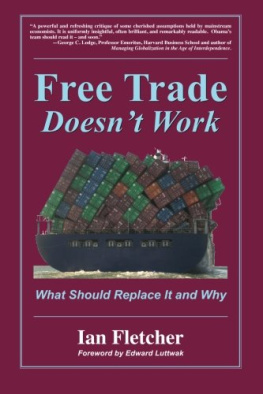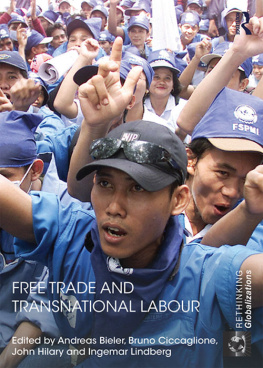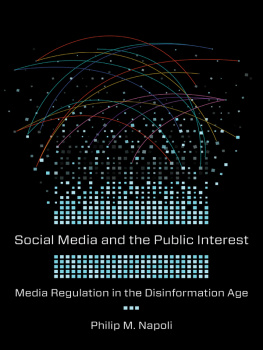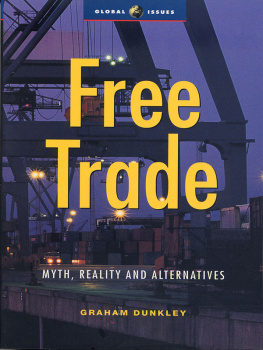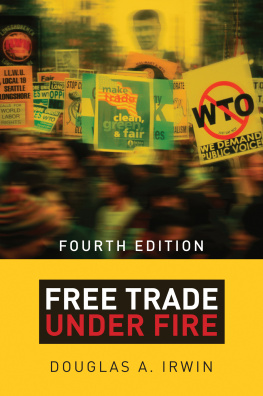Ian Fletcher - Free Trade Doesnt Work
Here you can read online Ian Fletcher - Free Trade Doesnt Work full text of the book (entire story) in english for free. Download pdf and epub, get meaning, cover and reviews about this ebook. year: 2010, publisher: U.S. Business & Industry Council, genre: Politics. Description of the work, (preface) as well as reviews are available. Best literature library LitArk.com created for fans of good reading and offers a wide selection of genres:
Romance novel
Science fiction
Adventure
Detective
Science
History
Home and family
Prose
Art
Politics
Computer
Non-fiction
Religion
Business
Children
Humor
Choose a favorite category and find really read worthwhile books. Enjoy immersion in the world of imagination, feel the emotions of the characters or learn something new for yourself, make an fascinating discovery.
- Book:Free Trade Doesnt Work
- Author:
- Publisher:U.S. Business & Industry Council
- Genre:
- Year:2010
- Rating:3 / 5
- Favourites:Add to favourites
- Your mark:
- 60
- 1
- 2
- 3
- 4
- 5
Free Trade Doesnt Work: summary, description and annotation
We offer to read an annotation, description, summary or preface (depends on what the author of the book "Free Trade Doesnt Work" wrote himself). If you haven't found the necessary information about the book — write in the comments, we will try to find it.
Free Trade Doesnt Work — read online for free the complete book (whole text) full work
Below is the text of the book, divided by pages. System saving the place of the last page read, allows you to conveniently read the book "Free Trade Doesnt Work" online for free, without having to search again every time where you left off. Put a bookmark, and you can go to the page where you finished reading at any time.
Font size:
Interval:
Bookmark:

Free Trade Doesnt Work
What Should Replace It and Why
by Ian Fletcher
Kindle Edition
Published by the U.S. Business & Industry Council
512 C St. NE
Washington, DC 20002
Copyright Ian Fletcher 2010
All Rights Reserved
ISBN-13: 978-0-578-04820-8
freetradedoesntwork.com
usbic.net
v.05.29.10

In Bangalore I [was] standing at the gate observing this river of educated young people flowing in and out...They all looked like they had scored 1,600 on their SATs and I felt a real mind-eye split overtaking me. My mind just kept telling me, Ricardo* is right, Ricardo is right... But my eye kept looking at these Indian zippies and telling me something else.
New York Times columnist Thomas L. Friedman, The World is Flat , p. 264
*David Ricardo (1772-1823), British economist who formulated the theory of comparative advantage, cornerstone of free trade economics to this day. See Chapter Five below for why Ricardo was wrong.
CONTENTS
PART I: THE PROBLEM
Chapter 3: Trade Solutions That Wont Work
PART II: THE REAL ECONOMICS OF TRADE
PART III: THE SOLUTION
Praise
About the Author
Until the economic debacle of 2008, the power and moral authority of the United States were sustained not only by its political values, cultural magnetism, and military strength, but also by its wealth. From its investment capacity as home of the worlds most sophisticated financial system to its purchasing power as the worlds largest importer, the U.S. had an un doubted primacy. When the latter finally ruined the formerfor huge trade deficits tolerated for decades must decapitalize as well as deindustrializeAmerican diplomacy suddenly had to function without much of its accustomed leverage.
Some Americans have always been displeased by the magnitude of American power, probably because they project onto the nation at large their own moral discomfort with its exercise. For them, as for assorted dictators, Islamic fanatics, and the few serious communists still breathing, the present weakening of the United States is welcome. But for others, including this writer, this weakening provokes an unwelcome question: how much power can the United States retain without this leverage? And what kind of Hobbesian world order will we face in its absence? Whatever complaints of competence or intent one may lodge against this power, the world contains alternative hegemons with far fewer scruples. A weakened American economy will embolden the enemies not only of the United States, but of a stable world generallyespecially in Latin America, the Middle East, and East Asia.
One early sign of Americas weakening economic leverage was the refusal of allies like France, Germany, Italy, and the Netherlands to cooperate with the expansionary measures of the newly arrived Obama Administration in early 2009. With global economic activity sinking as declining demand dragged down production, further reducing demand, only a Keynesian jolt of public spending or tax cuts could break the downward spiral. This much was agreed by all serious players, but every major European government save Britain refused to join with the United States in implementing such measures. Instead, they tacitly proposed to let others carry the burdens of reflationmainly increased public debt and inflation riskknowing full well that their own exporters would nonetheless benefit from the resulting increase in global demand.
Above all, these allies could not be brought to heel with the threat of ta riffs, quotas, capital controls, or other protectionist measures. This was Americas natural card to play, but ruled out by an elite consensus rigidly opposed to any form of protectionism. This consensusunshared with or dinary votersprohibits even the milder forms of protectionism permitted under international agreements. Instead, it has a puritanical horror of the very concept which refuses to view protectionism as just another form of economic realpolitik, to be coldly evaluated according to its merits and costs. Instead, it is seen as a repudiation of the twin cardinal virtues of competition and openness.
This is a fact of which both Americas friends and enemies are well aware, and upon which Americas commercial rivals base their own neomercantilist trade policies. The result has been a prolonged failure to safeguard the American economy, especially manufacturing, from foreign predation. The most obvious tactic here has been currency manipulation, but this is only the tip of an iceberg whose size Americas rulers still do not appear fully to comprehend. This currency manipulation, involving as it does a tidal wave of cheap foreign capital propping up the dollar by soak ing up American debt and assets, has in recent years helped keep interest rates in the U.S. abnormally low. It thus helped enable the speculative property and mortgage bubbles which led to the financial collapse of 2008. Thus many of Americas recent economic problems, both visibly trade-related and otherwise, are ultimately linked with an underlying trade problem.
This book, unlike many previous critiques of free trade, is no mere sulk about the harsh realities of capitalism or an extended analytical misunderstanding of what those realities are. Ian Fletcher, in fact, unequivocally favors capitalismif perhaps more broadly shared in its prosperity, more Fordist (as in the $5 day), less dogmatic about free markets, better supported by industrial policy, and less decadently plutarchic than today. He favors free markets wherever the evidence vindicates them. These remain the sovereign cure for mediocrity and sloth, whose dynamism creates wealth and compels improvements in management, production, and distribution. Free markets stimulate innovation, the ultimate root of economic growth. All these facts this book comprehends, which should slow its dismissal by the usual suspects.
Devotees of free trade celebrate its advantages for American consumers. These are real enough. And even industry-destroying free trade can sometimes do good, by shutting down inefficient domestic production that misuses labor and capital, freeing up resources for the industries of tomorrow. But free traders celebrate these advantages and then just stop, as if Americans could be consumers and nothing but, and as if destroying obsolete industries did not beg the question of what is to replace them. The vitality of Americas underlying industrial base is either ignored or papered over with questionable economic theoryif not sheer ideological hectoring.
This is where Fletcher comes into his own, for he pries open the dogmatic black box of received trade economics. Despite the myth that serious economics vindicates free trade simpliciter , he shows in meticulous detail how the mechanisms which supposedly vindicate unlimited free trade under all circumstances are in fact dubious intellectual contraptions predicated upon unrealistic assumptions. The presumption of free and unmanipulated currency markets is only the most obvious example; there are many others. Fletcher also elucidates recent theoretical breakthroughs in economics that are finally bringing realism into the doctrinaire mathematical world of academic trade economics, advances that are undermining the intellectual respectability of conventional free trade theory as now commonly understood.
These days, some of the leading practitioners of free trade, the chief executives of the largest U.S. corporations, are also quietly starting to reverse course. They, too, now proclaim that the United States must manufacture more and export more manufactured goods. Certain well-known firms are bellwethers of this change. For example, over the past 15 years, Boeing executives made many a speech celebrating the globalization of their companys manufacturing operations. They tirelessly invoked free trades logic of comparative advantage to explain why they dismissed American engineers and production workers while Boeings risk-sharing partners were increasing employment overseas. They strove to impress Wall Street analysts with their periodic downsizings of thousands of workers at a time. These efforts to transfer manufacturing and design overseas were crowned in the 787 Dreamliner, whose wing box and wings were made in Japan and whose composite fuselage was mostly made in Italyleaving little for the United States but final assembly. That overseas production might be cheaper merely because of subsidies by foreign governments seeking a foothold in this lucrative and strategic industry was irrelevant to Boeing, which is not responsible for the economy at large, but merely a business run for profit.
Next pageFont size:
Interval:
Bookmark:
Similar books «Free Trade Doesnt Work»
Look at similar books to Free Trade Doesnt Work. We have selected literature similar in name and meaning in the hope of providing readers with more options to find new, interesting, not yet read works.
Discussion, reviews of the book Free Trade Doesnt Work and just readers' own opinions. Leave your comments, write what you think about the work, its meaning or the main characters. Specify what exactly you liked and what you didn't like, and why you think so.

